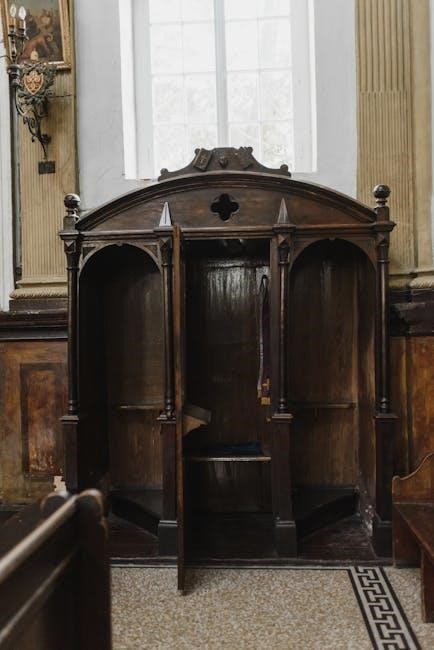
confession orthodox guide
Orthodox Confession is a sacrament where believers seek forgiveness and spiritual renewal through prayer‚ self-reflection‚ and the priest’s guidance‚ fostering a deeper connection with God․
1․1 The Sacrament of Repentance
The Sacrament of Repentance‚ or Holy Confession‚ is a divine mystery in the Orthodox Church where believers seek forgiveness for their sins․ It is a sacred act through which God’s mercy and grace are bestowed upon the penitent․ This sacrament is rooted in the teachings of Christ‚ who entrusted the disciples with the power to forgive sins (John 20:21-23)․ In Holy Confession‚ the priest acts as a witness and guide‚ while the believer openly acknowledges their sins‚ expressing genuine remorse and a commitment to change․ The sacrament is not merely a ritual but a profound encounter with God‚ offering spiritual healing‚ renewal‚ and reconciliation․ Through repentance‚ the faithful are restored to communion with God and the Church‚ embodying the transformative power of divine forgiveness․
1․2 Importance of Holy Confession in Orthodox Christianity
Holy Confession holds a vital place in Orthodox Christianity as a means of spiritual purification and growth․ It provides believers with the assurance of divine forgiveness‚ enabling them to draw closer to God․ Through this sacrament‚ individuals acknowledge their sins‚ express remorse‚ and commit to amendment‚ fostering a deeper sense of accountability and moral integrity․ Regular confession is encouraged to maintain spiritual health and to prepare worthily for Holy Communion․ It strengthens the believer’s resolve to live according to Christ’s teachings and fosters reconciliation within the Church community․ The sacrament underscores the transformative power of repentance‚ guiding Orthodox Christians toward a life of holiness and union with God․

Preparation for Confession
Preparation involves prayer‚ fasting‚ and self-examination‚ using guides like the Ten Commandments and the Sermon on the Mount to reflect on thoughts‚ words‚ and actions․
2․1 Examining Your Conscience
Examining your conscience is a vital step in preparation for confession‚ requiring honesty and self-awareness․ This process involves reflecting on your thoughts‚ words‚ and actions‚ identifying sins‚ and acknowledging areas for spiritual growth․ Using guides like the Ten Commandments and the Sermon on the Mount can help uncover sinful patterns and motivations․ Prayerfully ask God to reveal your faults and weaknesses‚ seeking humility and a sincere desire to repent․ This introspection should lead to a heartfelt acknowledgment of sins‚ fostering a deeper connection with God and His grace․ Remember‚ confession is not just about listing sins but about spiritual renewal and healing․
2․2 The Role of Prayer and Fasting

Prayer and fasting are essential components of preparation for confession‚ helping to humble the soul and focus the mind․ Through prayer‚ believers seek guidance and strength to acknowledge their sins sincerely․ Fasting‚ often observed during Church fasts‚ cleanses the body and soul‚ creating a receptive heart for grace․ Both practices work together to help individuals confront their spiritual weaknesses and approach confession with contrition․ By prayerfully examining their lives and abstaining from worldly distractions‚ Orthodox Christians prepare to receive the sacrament with humility and openness․ These disciplines are not mere rituals but means of cooperating with God’s grace to achieve true repentance and spiritual renewal․
2․3 Reading Guide for Self-Reflection
A reading guide for self-reflection is a vital tool in preparing for confession‚ helping believers examine their conscience and identify sins․ Recommended readings include the Ten Commandments‚ the Beatitudes‚ and the Sermon on the Mount‚ which provide a spiritual framework for self-assessment․ Additionally‚ writings from Church Fathers and Orthodox texts offer deeper insights into repentance and spiritual growth․ These materials guide individuals to reflect on their thoughts‚ words‚ and actions‚ fostering honesty and accountability․ By engaging with such readings‚ believers can better understand their shortcomings and approach confession with sincerity․ This practice ensures that the sacrament is entered into with a humble and prepared heart‚ ready to receive God’s forgiveness and grace․

The Sacrament of Confession
The Sacrament of Confession is a divine act where believers confess their sins to a priest‚ receiving absolution through prayer and the priest’s authority‚ restoring unity with God and the Church․

3․1 The Role of the Priest in Confession
The priest plays a vital role in Orthodox Confession as a spiritual guide and mediator․ They are ordained to represent Christ and the Church‚ offering divine forgiveness and guidance․ The priest listens to the confession‚ provides spiritual advice‚ and ensures the penitent is truly repentant; They also pray for the believer‚ asking God to grant forgiveness․ The priest’s authority comes from the Church‚ and their role is not to judge but to facilitate healing and reconciliation with God․ Confidentiality is strictly maintained‚ fostering trust and openness․ Through the priest‚ the sacrament’s grace is imparted‚ restoring the believer’s spiritual harmony and unity with the Church;
3․2 The Confessional Dialogue

The confessional dialogue is a sacred conversation between the believer and the priest‚ centered on acknowledging sins and seeking spiritual healing․ It begins with prayer‚ invoking God’s presence and grace․ The penitent openly shares their sins‚ demonstrating humility and genuine repentance․ The priest actively listens‚ offering words of comfort‚ guidance‚ and encouragement․ This dialogue is not a judgment but a means of restoration‚ helping the individual understand their actions’ impact and how to grow spiritually․ The priest may ask questions to clarify intentions or provide tailored advice․ Through this exchange‚ the believer experiences relief and renewed commitment to their faith․ The dialogue concludes with the priest pronouncing absolution‚ reinforcing God’s forgiveness and the believer’s reconciliation with Him and the Church․
3․3 Receiving Absolution and Forgiveness
Receiving absolution and forgiveness is the culminating moment of the confessional process‚ where the believer experiences divine mercy and reconciliation․ After openly confessing their sins‚ the priest pronounces the words of absolution‚ granting forgiveness in the name of God․ This sacramental act restores the believer’s spiritual unity with God and the Church‚ lifting the burden of guilt․ The absolution is a profound expression of God’s love and grace‚ offering the penitent a fresh start․ It is a moment of spiritual renewal‚ where the believer is encouraged to live a life transformed by repentance and faith․ This divine forgiveness strengthens the soul‚ enabling growth in virtue and a deeper commitment to following Christ․

Post-Confession Guidance
Post-confession guidance focuses on spiritual renewal and growth‚ helping believers avoid repeating sins and deepen their faith through prayer‚ reflection‚ and virtuous living․
4․1 Spiritual Growth After Confession
Spiritual growth after confession is a transformative process that deepens one’s relationship with God․ Through prayer‚ reflection‚ and virtuous living‚ believers cultivate humility and self-awareness․ Reading spiritual texts and engaging in acts of compassion further enrich their faith․ The healing grace received in confession empowers individuals to overcome sinful tendencies and embrace a life of love and repentance․ Regular prayer and participation in church life sustain this spiritual renewal‚ fostering a deeper connection with God and His will․ This ongoing journey of growth and self-improvement brings believers closer to the likeness of Christ‚ fulfilling their ultimate purpose in life․
4․2 Avoiding Repetition of Sins
Avoiding the repetition of sins after confession requires a commitment to spiritual growth and self-discipline․ Prayer and fasting are essential tools to strengthen one’s resolve and resist temptation․ Regular self-reflection and examination of conscience help identify patterns of sin‚ enabling believers to address root causes․ Seeking guidance from a spiritual father or priest provides additional support in overcoming sinful habits․ By fostering humility‚ gratitude‚ and a deep love for God‚ Orthodox Christians can avoid falling into the same sins․ Regular participation in sacraments‚ especially Holy Communion‚ reinforces the grace received in confession․ This holistic approach to spiritual life transforms the heart‚ leading to a life centered on Christ and His teachings․